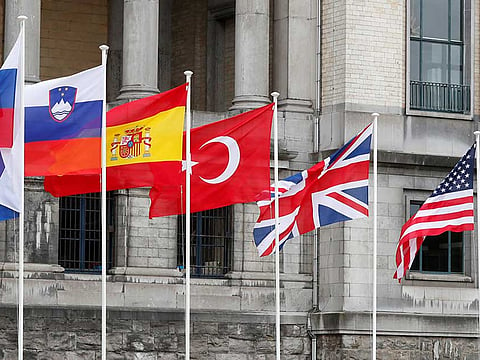Defence burden-sharing high on Nato summit agenda
Leaders will also take decisions to step up Nato’s role in the fight against terrorism, Stoltenberg said

Brussels: The North Atlantic Treaty Organisation (Nato) summit on Wednesday and Thursday in Brussels aims at beefing up responses to global threats.
Nato Secretary General Jens Stoltenberg told reporters on the eve of the summit that “the leaders of 29 Nato Allies and many partner nations would take decisions to strengthen Nato’s deterrence and defence, step up in the fight against terrorism, and achieve fairer burden-sharing.”
“On Wednesday, defence spending and burden-sharing will be high on the agenda. In 2014, Nato allies agreed to stop the cuts, start to increase and move towards spending 2 per cent of GDP on defence within a decade,” he said.
“Since then, Allies have made major progress. We expect eight allies to spend at least 2 per cent of GDP on defence this year, compared to just three allies in 2014.
Allies are also investing billions in new equipment and stepping up their contributions to missions and operations, he added.
“We estimate that European allies and Canada will add an extra $266 billion to defence between now and 2024.”
Leaders will also take decisions to step up Nato’s role in the fight against terrorism, Stoltenberg said.
“They will agree to launch a new training mission in Iraq, with hundreds of Nato trainers. Military schools will also be set up to increase the professionalism of Iraqi forces. In addition, allies will agree more support for key partners in the Middle East and North Africa, including Tunisia and Jordan.”
To strengthen Nato’s deterrence and defence, leaders are expected to adopt a Readiness Initiative – the ‘Four Thirties’.
“This is a commitment to have by 2020, 30 mechanised battalions, 30 air squadrons and 30 combat vessels, ready to use within 30 days or less.”
The member states are also expected to agree on a new Nato Command Structure, including a new command for the Atlantic in Norfolk, Virginia, a command for military mobility in Europe in Ulm, Germany, and a Cyber Operations Centre.
In addition, allies will discuss Nato’s response to hybrid threats and agree to set up new counter-hybrid support teams to help allies at risk.
On Thursday, the summit will close with a meeting on Afghanistan, where Nato’s Resolute Support partners will join the alliance members.
“Our presence in Afghanistan is vital to ensuring the country never again becomes a safe haven for international terrorism. Leaders are expected to agree to extend funding for the Afghan forces beyond 2020 and express their support for President [Ashraf] Gani’s peace initiative and reform efforts.”
The summit in Brussels is the 29th by the alliance established in 1949. The first one was in December 1957, and the most recent took place in Warsaw in July 2016.
The summit, the seventh hosted in Brussels, will be attended by 64 official delegations that include all 29 Nato members, 20 partner countries and representatives from the United Nations, the European Union, the World Bank and the Nato Parliamentary Assembly.



